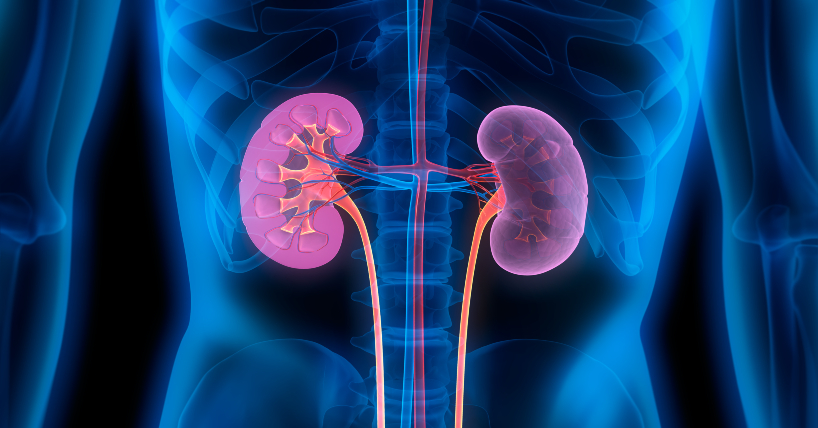Kidney C3G
Treatment found to transform the lives of rare kidney disease patients
Published on: 25 September 2025
Newcastle researchers have revealed the first treatment to target the underlying cause of a rare kidney condition called “C3G” and prevent the disease progressing.
Publishing in the medical journal, The Lancet, the Newcastle kidney experts demonstrate that a new treatment called iptacopan, made by Novartis, prevents the complement system from damaging the kidneys. The treatment stops protein loss from the kidneys and stabilises the kidney function.
The trial, with C3G patients from around the world, compared treatment with the drug Iptacopan to a placebo and demonstrated that it was both effective and safe.

What is C3G?
C3G – or Complement 3 glomerulopathy - happens when part of the immune system, called the complement system, over-reacts resulting in damage to the body’s own kidneys, specifically tiny filters, called the glomeruli, which are responsible for filtering the blood of toxins and producing urine.
The complement system is made up of proteins in the blood that kill bacteria and prevent infection.
Until now there has been no known effective treatment for this condition and most patients progressed to end-stage kidney failure and required kidney dialysis. Additionally, when patients received a kidney transplant the disease would usually come back resulting in a failed transplant.
Now, the results of this phase III trial- called APPEAR-C3G - demonstrate for the first time that the new treatment, iptacopan, made by Novartis, prevents the complement system from damaging the kidneys by stopping protein loss from the kidneys and stabilising kidney function.
"a pivotal moment for patients"
Dr Edwin Wong, consultant nephrologist at Newcastle Hospitals and honorary senior clinical lecturer at Newcastle University, was UK chief investigator for the trial. He said: “C3G has a very a poor prognosis and usually leads to long-term dialysis or a kidney transplant, but there is no guarantee that patients won’t relapse, even with a new transplanted kidney.
“Not only did results show that the treatment prevented proteins leaking into the urine, but it also targeted the over-activation of the complement system that we see in the disease.”
The study’s senior author is Professor David Kavanagh, professor of complement therapeutics at Newcastle University and honorary consultant nephrologist at the National Renal Complement Therapeutics Centre at Newcastle Hospitals. He added: “Conditions such as C3G are rare but can have a devastating impact on patients and their families.
“Now, for the first time, we have a treatment that targets the underlying cause of C3G and prevents the disease progressing.
“The results of the research mark a pivotal moment for patients with C3G where previously there was no effective treatment.”
“This study highlights the importance of global collaboration between researchers, the pharmaceutical industry and the patients who take part in research studies to bring meaningful change to patients with rare disease.
“If it becomes available for patients, more research will be required to establish how best to use the drug, including the most appropriate length of use.”
Dr Wong added: “We are grateful to the patients who took part in this trial, and the teams whose hard work and dedication got us to this point.”
Ruchira Glaser, the Global Head, Cardiovascular, Renal and Metabolic Development Unit of medicines company, Novartis, said: “C3G can have dramatic impacts to patients’ lives. At Novartis we're committed to protecting kidney health and transforming care for people with high unmet needs. That’s why we’ve partnered with clinicians, researchers, and advocates to identify and address treatment gaps - working together to bring innovative treatment to those affected.”
Reference: Oral iptacopan therapy in patients with C3 glomerulopathy: a randomised, double-blind, parallel group, multicentre, placebo-controlled, phase 3 study. Kavanagh, DavidEspinosa, Alejandra Ines et al. The Lancet.

James’ story
51-year-old James Mason, was diagnosed with the ultra-rare kidney disease Complement 3 glomerulopathy (C3G) when he was 40 years old. He said:
“It took a long time to diagnose as it is a rare disease, but to be told after diagnosis that the worst-case scenario was kidney failure in around 10 years and there was nothing that could be done about it was a real shock.”
James had very high levels of protein in his urine, which was alarming to his clinical team, often having to come into hospital at short notice for treatment. He went through many trials of medication to try and control the levels, including the use of diuretics, which had a huge impact on his life.
He commented: “The knock-on effects of these drugs were awful. I work on building sites, and it was awkward having to go to the toilet every 15 minutes. I was also put on statins for cholesterol and developed gout. I was rattling in the morning taking all these medications, it was tedious and depressing.
“I felt terrible. It was hard to work, and I stopped running and going to the gym. It’s hard to be objective about the impact on my life, but I scaled everything right back.”
James was offered the chance to take part in the APPEAR-C3G trail, to help further understand the disease and potentially transform the lives of others, he commented: “I hate to use this word, but I felt empowered. It is nice know you are helping yourself and adding to broaden the understanding of the disease, it was good to be part of.”
The research was led by Newcastle kidney experts and could now potentially treat this rare kidney condition, James has experienced firsthand the results of the trial, he said:
“Before the trial I had fatigue and was on diuretics things were really not good. I had swelling in my face, hands and feet. I was short of breath and had visual edema. These have all improved.
“My potassium levels have dropped right off. all the markers that were flagged up that made me eligible for the clinical trial are now all almost at nominal levels including protein.
“I can’t understate the positive psychological effects from being part of the trial. That feeling of yes, something is working is fantastic.”
(Adapted with thanks to The Newcastle upon Tyne Hospitals NHS Foundation Trust.)




